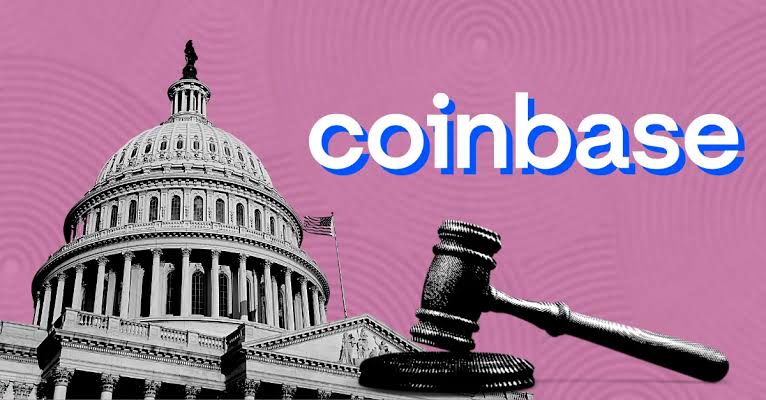Coinbase has filed a closing brief in a lawsuit against the SEC, highlighting the agency’s refusal to develop clear standards for digital asset compliance.
A large cryptocurrency exchange, Coinbase, has submitted its closing brief in a lawsuit that is challenging the Securities and Exchange Commission (SEC).
The Securities and Exchange Commission (SEC), the subject of this lawsuit, denied Coinbase’s rulemaking petition, which the exchange claims is essential for the digital asset business.
The brief also highlights the regulatory agency’s shift in stance toward cryptocurrency. There is a single statement in the SEC’s refusal that provokes controversy, and this sentence is at the core of Coinbase’s argument.
Contents Of Coinbase’s Closing Brief
The SEC’s order just stated that it “disagree[d]” with Coinbase’s concerns over the practicability of the laws that are already in place for digital asset companies.
In this disagreement, Coinbase asserts that there is a lack of reasoned decision-making. Paul Grewal, Coinbase’s Chief Legal Officer, argued that the order issued by the SEC should only be revoked on the basis of this elementary foundation.
In its brief, Coinbase notes a concerning trend of activity on the part of the SEC. Based on a broad interpretation of its jurisdiction, the Securities and Exchange Commission (SEC) has required compliance from companies that deal in digital assets; nevertheless, it has refused to develop clear standards that would permit such compliance.
Instead, the Securities and Exchange Commission has initiated massive litigation against businesses for failing to comply with regulations that are not clear.
The brief claims that “this pattern of conduct is a purposeful effort to destroy an industry by demanding the impossible and prosecuting companies that fail to achieve it.” The aim is to devastate the industry. In addition to this, Grewal elaborates on the broader implications of the regulatory agency’s stance.
Furthermore, the Securities and Exchange Commission asserts that it is not required to make compliance possible for the industry. As stated in the concluding brief, “The Securities and Exchange Commission appears to view its rules not as instruments that enable compliance with federal statutes but rather as weapons to dismantle industries that it does not favor.”
In addition, the agency’s argument for its position includes pointing to the numerous enforcement actions it has taken as evidence that the rules that are now in place continue to be effective. Coinbase, on the other hand, argues that these enforcement operations are only a component of a larger strategy to bring down the digital asset market.
The company Coinbase contends that “they are a bludgeon by design.” In addition to this, the brief discusses the inconsistent attitude that the SEC has taken toward digital assets over the course of the years.
Shift In SEC Chair Gary Gensler’s Stance
Gary Gensler, the chair of the Securities and Exchange Commission, has made statements from 2021 in which he acknowledged the absence of a clear legal framework for cryptocurrency exchanges to statements in which he asserts wide regulatory authority one year later.
In addition, the Securities and Exchange Commission (SEC) did not indicate that Coinbase’s business model violated any securities rules when it approved the company to go public in the year 2020. The Securities and Exchange Commission (SEC) has filed a lawsuit against Coinbase, asserting that the company’s business methods are illegal.
Furthermore, the cryptocurrency exchange underlines that the SEC’s shifting positions and inconsistent enforcement actions have created an environment that is fraught with confusion and uncertainty. Despite not classifying Bitcoin and Ether as securities, the Securities and Exchange Commission (SEC) has not offered an explanation for handling other digital assets differently.
The Securities and Exchange Commission (SEC) has selectively targeted tokens in its enforcement actions, which is an example of this discrepancy. An additional source of dispute is the Securities and Exchange Commission’s (SEC) reliance on its ambiguous “facts and circumstances” test when deciding whether or not digital assets are securities.
Coinbase argues that this standard is overly general and does not provide any specific direction. The Securities and Exchange Commission (SEC), according to the CEX, has never offered a clear explanation for why the facts and circumstances of Bitcoin and Ether differ from those of the tokens it has declared to be securities.
Furthermore, Coinbase emphasizes that rulemaking is the appropriate method to address these challenges. Before enforcing its regulatory approach, the Securities and Exchange Commission (SEC) must explain its coherent philosophy, invite public discussion, and subject it to judicial review.
By implementing this approach, the digital asset business would have the clarity and fairness that it requires.The closing brief submitted by Coinbase serves to emphasize the importance of judicial intervention.
Moreover, the corporation urges the court to not only nullify the SEC’s ruling but also mandate the formulation of fresh regulations. The conclusion of the brief states that “the only thing that will put an end to the SEC’s caprice is a court order that directs it to begin rulemaking.”
